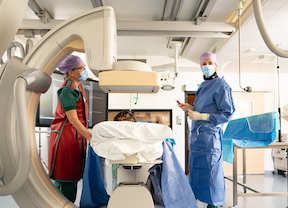PhD position in adaptive MRI-guided radiotherapy
PhD position in adaptive MRI-guided radiotherapy
You cannot apply for this job anymore (deadline was 31 Oct 2024).
Browse the current job offers or choose an item in the top navigation above.
Job description
The vacancy is part of the ART-PIVOT (Adaptive RadioTherapy – Personalized Intrafractional Volumetric Oncological Targeting) project, which is funded by NWO and co-funded by industrial partners through the open technology programme. The aim of ART-PIVOT to enable fast and continuous volumetric modulated arc therapy (VMAT) for MR-linacs, which is expected to dramatically increase the treatment delivery speed.
As PhD student you will first develop a set of high-performance VMAT therapy plan optimization algorithms, ensuring a low computational latency for plan generation as well as an effective deliverability on the treatment machine. In addition to the high numerical efficiency of the optimizer that you will develop, the algorithms should also leverage the hardware acceleration provided by modern GPU’s and FPGA’s, with support from our industrial partners Elekta and AimValley. You will then build an in-silico demonstrator, showcasing the capabilities of the implemented therapy planning framework for online/real-time adaptation and comparing the dosimetric performance with conventional multi-beam MR-linac deliveries.
Background
A new generation of radiotherapy treatment machines called MR-linac allows for the delivery of radiation cancer treatments with unprecedented accuracy and precision. This is mainly because such machines can deliver radiation while simultaneously providing MR images, facilitating the clear identification of the tumour and surrounding healthy tissue. In turn, this allows for precise therapy planning and adaptation, in accordance with the location of the target area at the time of treatment, potentially under the effect of anatomical and physiological motion. One of the drawbacks, however, is that the creation and delivery of a therapeutic plan on the MR-linac currently requires a considerably longer time compared to their counterpart on conventional CT-guided linacs. The reason behind this is the fact that the treatment is delivered as a sequence of radiation beams with extended pauses between each partial segment. In addition, plan generation itself implies solving a complex optimization problem to simultaneously maximize the radiation delivered to the target areas as well as healthy tissue sparing. The aim of the project is to develop a time-effective solution for therapy plan creation and delivery for MR-linacs.
As PhD student you will first develop a set of high-performance VMAT therapy plan optimization algorithms, ensuring a low computational latency for plan generation as well as an effective deliverability on the treatment machine. In addition to the high numerical efficiency of the optimizer that you will develop, the algorithms should also leverage the hardware acceleration provided by modern GPU’s and FPGA’s, with support from our industrial partners Elekta and AimValley. You will then build an in-silico demonstrator, showcasing the capabilities of the implemented therapy planning framework for online/real-time adaptation and comparing the dosimetric performance with conventional multi-beam MR-linac deliveries.
Background
A new generation of radiotherapy treatment machines called MR-linac allows for the delivery of radiation cancer treatments with unprecedented accuracy and precision. This is mainly because such machines can deliver radiation while simultaneously providing MR images, facilitating the clear identification of the tumour and surrounding healthy tissue. In turn, this allows for precise therapy planning and adaptation, in accordance with the location of the target area at the time of treatment, potentially under the effect of anatomical and physiological motion. One of the drawbacks, however, is that the creation and delivery of a therapeutic plan on the MR-linac currently requires a considerably longer time compared to their counterpart on conventional CT-guided linacs. The reason behind this is the fact that the treatment is delivered as a sequence of radiation beams with extended pauses between each partial segment. In addition, plan generation itself implies solving a complex optimization problem to simultaneously maximize the radiation delivered to the target areas as well as healthy tissue sparing. The aim of the project is to develop a time-effective solution for therapy plan creation and delivery for MR-linacs.
Specifications
- max. 36 hours per week
- max. €3824 per month
- Utrecht View on Google Maps
Requirements
- You have obtained your master’s degree in applied mathematics, computer science, or a related technical discipline.
- You have demonstrable experience with numerical optimization algorithm.
- You have hands-on experience with C++ as well as Matlab or Python programming (basic knowledge of GPU programming using the CUDA SDK is a plus).
- You are proficient in spoken and written English.
- The ability to work comfortably in an interdisciplinary environment including industrial partners is a strong plus.
You can apply for this position by reacting to this vacancy and providing:
- an up-to-date CV + course list + grade report.
- a motivation letter (1 page) describing your background and interests as relevant to the vacancy.
Conditions of employment
The maximum salary for this position (36 - 36 hours) is € 3.824,00 gross per month based on full-time employment.
In addition, we offer an annual benefit of 8.3%, holiday allowance, travel expenses and career opportunities. The terms of employment are in accordance with the Cao University Medical Centers (UMC).
In addition, we offer an annual benefit of 8.3%, holiday allowance, travel expenses and career opportunities. The terms of employment are in accordance with the Cao University Medical Centers (UMC).
Department
You will be working at Center for Image Sciences at the UMC Utrecht, within the Radiotherapy department. In this project, you will collaborate with a multi-disciplinary team of image scientists, computer scientists, (medical) physicists, radiologists, and radiation oncologists.
Specifications
- PhD; Research, development, innovation
- Health
- max. 36 hours per week
- max. €3824 per month
- University graduate
- 2024-4810
:fill(white)/logos/umcu-en-wide.jpg)
